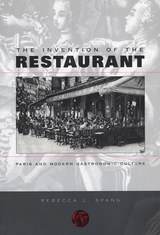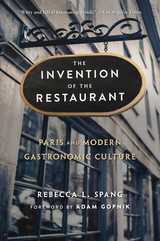
Why are there restaurants? Why would anybody consider eating to be an enjoyable leisure activity or even a serious pastime? To find the answer to these questions, we must accompany Rebecca Spang back to France in the eighteenth century, when a restaurant was not a place to eat but a thing to eat: a quasi-medicinal bouillon that formed an essential element of prerevolutionary France's nouvelle cuisine. This is a book about the French Revolution in taste and of the table--a book about how Parisians invented the modern culture of food, thereby changing their own social life and that of the world.
During the 1760s and 1770s, those who were sensitive and supposedly suffering made public show of their delicacy by going to the new establishments known as "restaurateurs' rooms" and there sipping their bouillons. By the 1790s, though, the table was variously seen as a place of decadent corruption or democratic solidarity. The Revolution's tables were sites for extending frugal, politically correct hospitality, and a delicate appetite was a sign of counter-revolutionary tendencies. The restaurants that had begun as purveyors of health food became symbols of aristocratic greed. In the early nineteenth century, however, the new genre of gastronomic literature worked within the strictures of the Napoleonic police state to transform the notion of restaurants and to confer star status upon oysters and champagne. Thus, the stage was set for the arrival of British and American tourists keen on discovering the mysteries of Frenchness in the capital's restaurants. From restoratives to Restoration, Spang establishes the restaurant at the very intersection of public and private in French culture--the first public place where people went to be private.

Winner of the Louis Gottschalk Prize
Winner of the Thomas J. Wilson Memorial Prize
“Witty and full of fascinating details.”
—Los Angeles Times
Why are there restaurants? Why would anybody consider eating alongside perfect strangers in a loud and crowded room to be an enjoyable pastime? To find the answer, Rebecca Spang takes us back to France in the eighteenth century, when a restaurant was not a place to eat but a quasi-medicinal bouillon not unlike the bone broths of today.
This is a book about the French revolution in taste—about how Parisians invented the modern culture of food, changing the social life of the world in the process. We see how over the course of the Revolution, restaurants that had begun as purveyors of health food became symbols of aristocratic greed. In the early nineteenth century, the new genre of gastronomic literature worked within the strictures of the Napoleonic state to transform restaurants yet again, this time conferring star status upon oysters and champagne.
“An ambitious, thought-changing book…Rich in weird data, unsung heroes, and bizarre true stories.”
—Adam Gopnik, New Yorker
“[A] pleasingly spiced history of the restaurant.”
—New York Times
“A lively, engrossing, authoritative account of how the restaurant as we know it developed…Spang is…as generous in her helpings of historical detail as any glutton could wish.”
—The Times
READERS
Browse our collection.
PUBLISHERS
See BiblioVault's publisher services.
STUDENT SERVICES
Files for college accessibility offices.
UChicago Accessibility Resources
home | accessibility | search | about | contact us
BiblioVault ® 2001 - 2024
The University of Chicago Press









